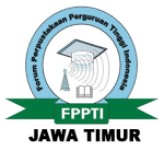Role of academic library in creating students' mental health literacy
Downloads
Background of the study: Mental health literacy is a very important skill because mental health is as important as physical health. University students must have mental health literacy because they face heavy pressure in the learning process and in social interactions. Academic libraries can play an active role in creating students' mental health literacy.Purpose: to identify and explain how the role of academic libraries in creating students' mental health literacy.
Method: It is a literature review, namely reviewing the books, journal articles, news, reports on mental health, mental health among students, the function and role of the academic library. Next, synergize the results of the study with the results of the researchers' thoughts.
Findings: Academic libraries can carry out various activities as an effort to create students' mental health literacy, namely providing easy access to mental health information sources through library collections development and providing mental health corners; promoting mental health collections in the library; organize mental health literacy campaigns through events such as seminars; providing health consultation facilities in collaboration with mental health professionals such as psychologists and psychiatrists.
Conclusions: Academic libraries can play an active role in creating students' mental health literacy by utilizing their resources and by collaborating with professionals.
Downloads
Adnamazida, R. (2013). 7 penyebab stres pada mahasiswa. Merdeka.Com. https://www.merdeka.com/sehat/7-penyebab-stres-pada-mahasiswa.html
Green, M. P. (2020). Inclusive library service to individuals with mental illnesses and disorders. International Journal of Information, Diversity and Inclusion, 4(1), 119–126. https://doi.org/10.33137/ijidi.v4i1.32500
Jorm, A. . (2000). Mental health literacy: Public knowledge and beliefs about mental disorders in mainland China. BRITISH JOURNAL OF PSYCHIATRY, 177, 396–401. https://doi.org/10.1002/pchj.55
Kankam, P. K., & Baffour, F. D. (2021). Why librarians matter in the promotion of mental health literacy in higher education. International Journal of Innovation, Creativity and Change, 15(1), 1–17. https://www.ijicc.net/images/Vol_15/Iss_1/15101_Kankam_2021_R.pdf
Kavanaugh, E. B. (2021). Information literacy, mental health, and lifelong learning: librarians and health care professionals in academic, clinical, and hospital settings. Journal of Hospital Librarianship, 21(1), 20–35. https://doi.org/10.1080/15323269.2021.1860449
Kementerian Kesehatan Republik Indonesia. (2018). Pengertian kesehatan mental. https://promkes.kemkes.go.id/pengertian-kesehatan-mental
Kurniawan, A. (2021). Pengertian mahasiswa menurut para ahli beserta peran dan fungsinya. https://www.gurupendidikan.co.id/pengertian-mahasiswa/
Legiran, Azis, M. Z., & Bellinawati, N. (2015). Faktor risiko stres dan perbedaannya pada mahasiswa berbagai angkatan di Fakultas Kedokteran Universitas Muhammadiyah Palembang. Jurnal Kedokteran Dan Kesehatan, 2(2), 197–202. https://ejournal.unsri.ac.id/index.php/jkk/article/view/2556
McCullis, D. (2012). Perspectives bibliotherapy : historical and research perspectives. Journal of Poetry Therapy: The Interdisciplinary Journal of Practice, Theory, Research and Education, 25(1), 23–38. https://doi.org/10.1080/08893675.2012.654944
Melaku, L., Mossie, A., & Negash, A. (2015). Stress among medical Students and its association with substance use and academic performance. Journal of Biomedical Education, 2015, 1–9. https://doi.org/10.1155/2015/149509
Mendikbud Buka "The 8th Tel-U Literacy Event 2021.” (2021). Jabar Publisher. https://www.jabarpublisher.com/index.php/2021/10/03/mendikbud-buka-the-8th-tel-u-literacy-event-2021/
Merga, M. (2020). How can school libraries support student wellbeing? Evidence and implications for further research. Journal of Library Administration, 60(6), 660–673. https://doi.org/10.1080/01930826.2020.1773718
Nasir, M. (2013). Metode penelitian. Ghalia Indonesia.
Nuallaong, W. (2011). Correlation between stressors and academic performance in second year medical students. Journal of the Medical Association of Thailand. https://www.researchgate.net/publication/225057069_Correlation_between_stressors_and_academic_performance_in_second_year_medical_students
Papadopoulos, C., & Ali, N. (2013). Stress levels and their risk / protective factors among MSc Public Health students. Journal of Pedagogic Development, 3(2), 5–10. https://www.beds.ac.uk/jpd/volume-3-issue-2/stress-levels-and-their-riskprotective-factors-among-msc-public-health-students/
Putra, W. (2019). Tiga mahasiswa Unpad bunuh diri, psikiater ungkap penyebabnya. Detiknews. https://news.detik.com/berita-jawa-barat/d-4463416/tiga-mahasiswa-unpad-bunuh-diri-psikiater-ungkap-penyebabnya
Sulistyo-Basuki. (1991). Pengantar ilmu perpustakaan. Gramedia Pustaka Utama.
Tanrikulu, I. (2011). Self-help books and bibliotherapy : Reflections for Turkey. Procedia - Social and Behavioral Sciences, 30, 1862–1866. https://doi.org/10.1016/j.sbspro.2011.10.361
UNICEF. (2020). Cyberbullying: Apa itu dan bagaimana menghentikannya. https://www.unicef.org/indonesia/id/child-protection/apa-itu-cyberbullying
Yontz-orlando, J. (2017). Bibliotherapy for mental health. International Research in Higher Education, 2(2), 67–73. https://doi.org/10.5430/irhe.v2n2p67
Copyright (c) 2022 Neneng Komariah, Encang Saepudin, Rizki Nurislaminingsih

This work is licensed under a Creative Commons Attribution-ShareAlike 4.0 International License.
Record and Library Journal by Unair is licensed under a Creative Commons Attribution-ShareAlike 4.0 International License.
1. The journal allows the author to hold the copyright of the article without restrictions.
2. The journal allows the author(s) to retain publishing rights without restrictions
3. The legal formal aspect of journal publication accessibility refers to Creative Commons Attribution Share-Alike (CC BY-SA).
4. The Creative Commons Attribution Share-Alike (CC BY-SA) license allows re-distribution and re-use of a licensed work on the conditions that the creator is appropriately credited and that any derivative work is made available under "the same, similar or a compatible license”. Other than the conditions mentioned above, the editorial board is not responsible for copyright violation.


 57201398420
57201398420

























